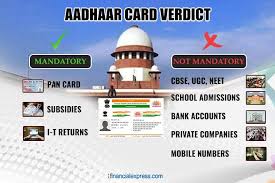
Adultery is no more a crime : Supreme Court
“Adultery can be ground for any civil wrong. There can’t be any social license that destroys the matrimonial home, but adultery should not be a criminal offence, provision of law …
Read MoreGlobal Indian News

“Adultery can be ground for any civil wrong. There can’t be any social license that destroys the matrimonial home, but adultery should not be a criminal offence, provision of law …
Read More
The Supreme Court today upheld the constitutional validity of the Aadhaar scheme but imposed some restrictions on its use The top court said Aadhaar is serving much bigger public interest and Aadhaar …
Read More
Amid intensifying power play in India’s southern province of Tamil Nadu, India’s Supreme Court has convicted a top leader of All India Anna Dravida Muunetra Kazagham (AIADMK), a chief ministerial aspirant, in a corruption case.
Read MoreThere is a thin line between artistic freedom and abusive outpourings. Lampoon or mock, by all means, but do not lapse into demeaning language against nationally and historically venerated figures like Mahatma Gandhi. This is the message from India’s Supreme Court, a sobering note amid a raging debate in the country over limits of the poetic license.
While allowing for the freedom to ideate, the country’s top court pointed out: “You cannot use abusive words for historical figures under the garb of artistic freedom. There is a complete freedom for ideas but the freedom of speech and expression is not absolute. The Constitution provides restrictions and it is a regulated freedom.”
In recent judgment, a bench comprising Justices Dipak Misra and Prafulla C. Pant, underlined that it was no offence to criticise, mock, lampoon and make parodies of the country’s iconic figures, but the freedom of expression cannot be stretched to demeaning them (by the use of abusive language). The same is an offence under Section 292 of Indian Penal Code, attracting a maximum jail term of two years.
The court’s directive was in response to a petition filed by a publisher who had published a poem on Mahatma Gandhi in 1984. The poem, ‘Gandhi Mala Bhetla Hota’ (I met Gandhi), written by Vasant Dattatray Gurjar, a Marathi poet, depicts the Mahatma as the narrator who uses obscene language in the poem. The bench agreed that the boundaries of freedom of speech has been expanding, but should not mean using abusive words against Mahatma Gandhi, the father of the nation, under Article 19(1) of the Constitution guaranteeing free speech.
Maldives is once again in the throes of political turmoil. Its transition to multi-party democracy, which had begun with the presidential elections of 2008, appears incomplete. The country’s first democratically …
Read More
Almost three years ago, the arrest of two Mumbai girls –-Shaheen Dhada and Rinu Shrinivasan — for an innocuous post on Facebook left law graduate Shreya Singhal outraged. In a …
Read More
In a decisive push to India’s battle against the scourge of black money, the BJP-led National Democratic Alliance (NDA) government has submitted a list to the Supreme Court, comprising 627 …
Read More